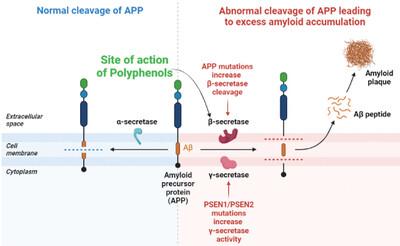靶向BACE1的多酚及其生物源纳米制剂抗淀粉样蛋白治疗应对阿尔茨海默病治疗的生物利用度、安全性和特异性的挑战
IF 4.5
2区 农林科学
Q1 FOOD SCIENCE & TECHNOLOGY
引用次数: 0
摘要
阿尔茨海默病(AD)是一种进行性神经退行性疾病,其特征是大脑大面积损伤和痴呆。阿尔茨海默病的病理标志之一是β -淀粉样蛋白(Aβ)。产生有毒的Aβ低聚物的生产和积累在大脑是该疾病的特征之一。β淀粉样蛋白切割酶1 (BACE1)催化降解淀粉样蛋白前体蛋白(APP)产生不溶性淀粉样斑块,从而引发Aβ异常积累。异常蛋白质是线粒体毒素,它破坏能量的产生,释放过多的自由基,导致神经元损伤和突变。因此,靶向a β相关通路已成为开发有效阿尔茨海默病治疗的焦点。许多用于治疗神经退行性疾病(ndds)的药物面临的一个障碍是血脑屏障(BBB)的渗透性受限。不幸的是,目前还没有抗淀粉样蛋白药物被临床批准。纳米技术的最新进展为将药物输送到特定目标提供了可能的解决方案。通过将天然产物与纳米药物方法相结合,有可能开发出治疗AD的新型高效治疗策略。本文章由计算机程序翻译,如有差异,请以英文原文为准。

Polyphenols and Their Biogenic Nano-Formulations Targeting BACE1 as Anti-Amyloid Therapies; Meeting the Challenges of Bioavailability, Safety, and Specificity for the Treatment of Alzheimer's Disease
Alzheimer's disease (AD), a progressiveneurodegenerative condition is marked by extensive damage in the brain and dementia. Among the pathological hallmarks of AD is beta-amyloid (Aβ). Production of toxic Aβ oligomers production and accumulation in the brain is among the characteristic features of the disease. The abnormal accumulation Aβ is initiated by the catalytic degradation of Amyloid Precursor Proteins (APP) by Beta Amyloid Cleaving Enzyme 1 (BACE1) to generate insoluble amyloid plaques. The abnormal proteins are mitochondrial poison which disrupt the energy production and liberate excessive free radicals causing neuronal damage and mutations. Consequently, targeting Aβ-associated pathways has become a focus in the pursuit of developing effective AD treatments. An obstacle faced by many medications used to treat neurodegenerative diseases (NDs) is the restricted permeability across the blood-brain barrier (BBB). Unfortunately, no anti-amyloid drug is clinically approved till now. Recent advancements in nanotechnology have provided a possible solution for delivering medications to specific targets. By integrating natural products with nano-medicinal approaches, it is possible to develop novel and highly efficient therapeutic strategies for the treatment of AD.
求助全文
通过发布文献求助,成功后即可免费获取论文全文。
去求助
来源期刊

Molecular Nutrition & Food Research
工程技术-食品科技
CiteScore
8.70
自引率
1.90%
发文量
250
审稿时长
1.7 months
期刊介绍:
Molecular Nutrition & Food Research is a primary research journal devoted to health, safety and all aspects of molecular nutrition such as nutritional biochemistry, nutrigenomics and metabolomics aiming to link the information arising from related disciplines:
Bioactivity: Nutritional and medical effects of food constituents including bioavailability and kinetics.
Immunology: Understanding the interactions of food and the immune system.
Microbiology: Food spoilage, food pathogens, chemical and physical approaches of fermented foods and novel microbial processes.
Chemistry: Isolation and analysis of bioactive food ingredients while considering environmental aspects.
 求助内容:
求助内容: 应助结果提醒方式:
应助结果提醒方式:


